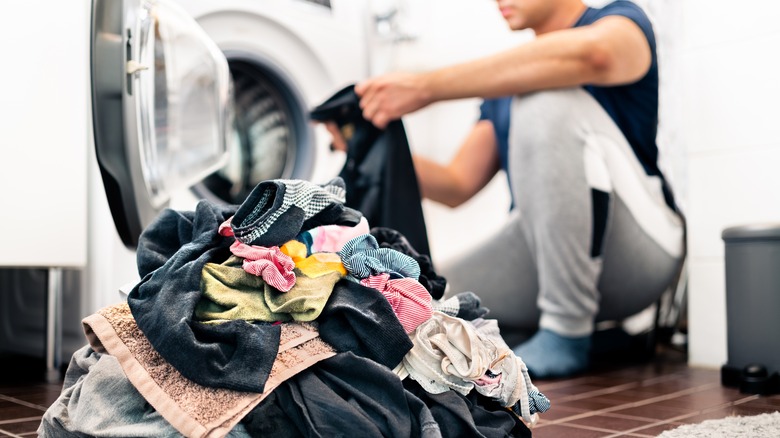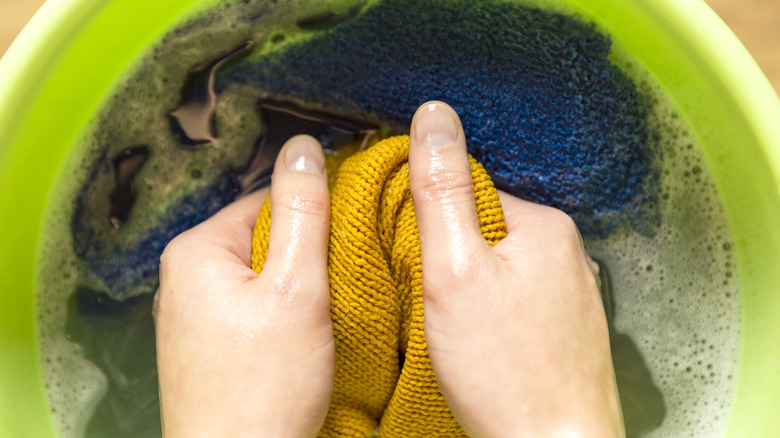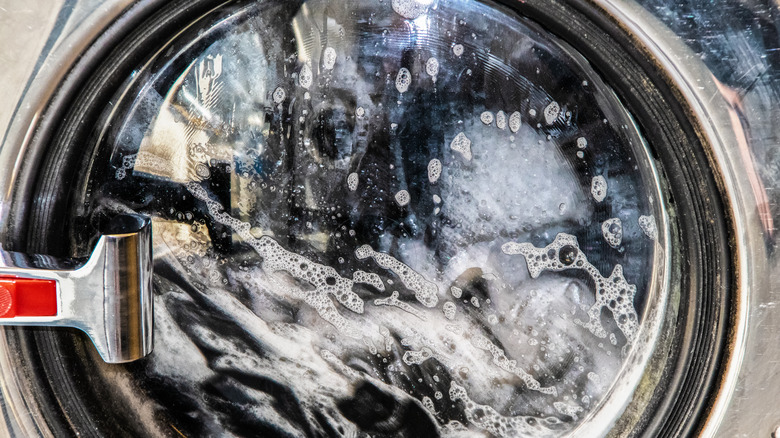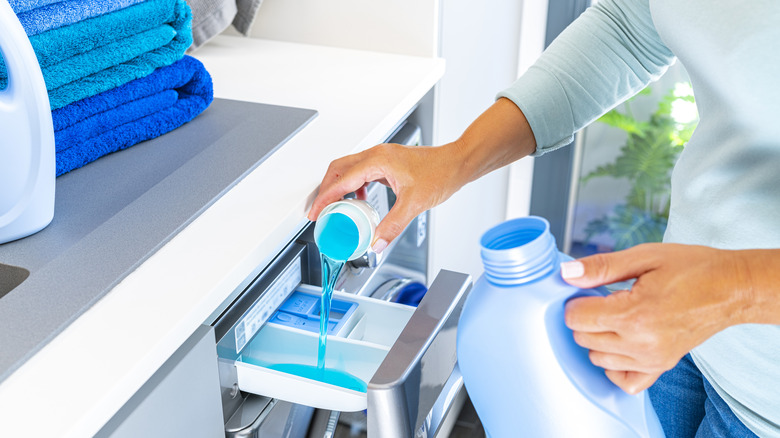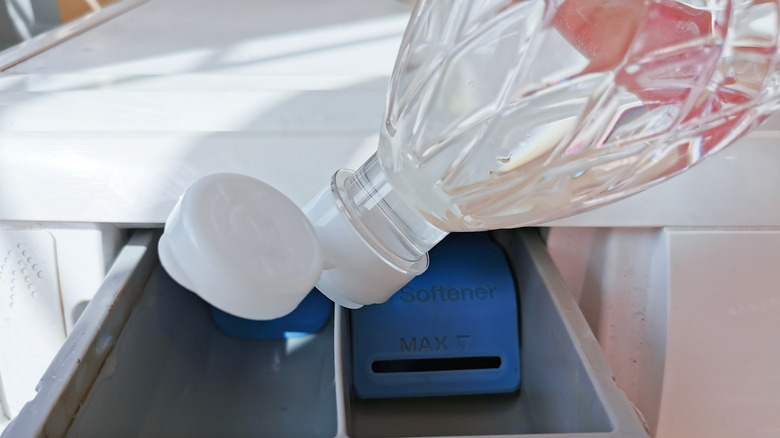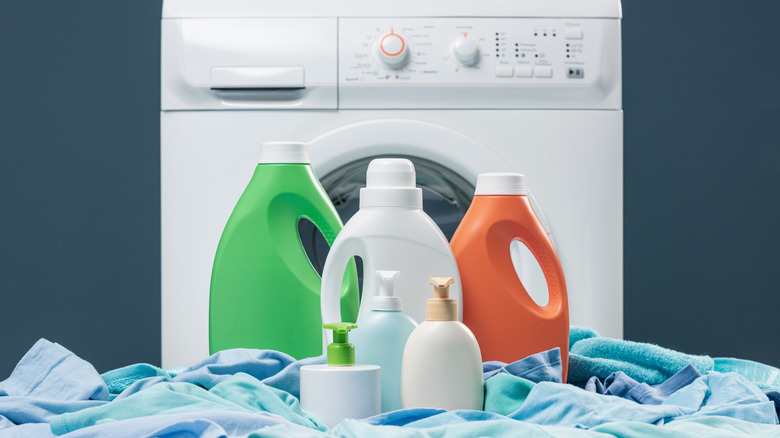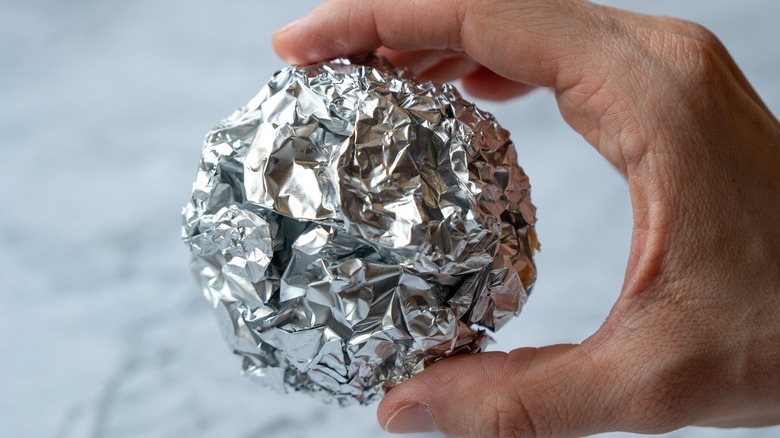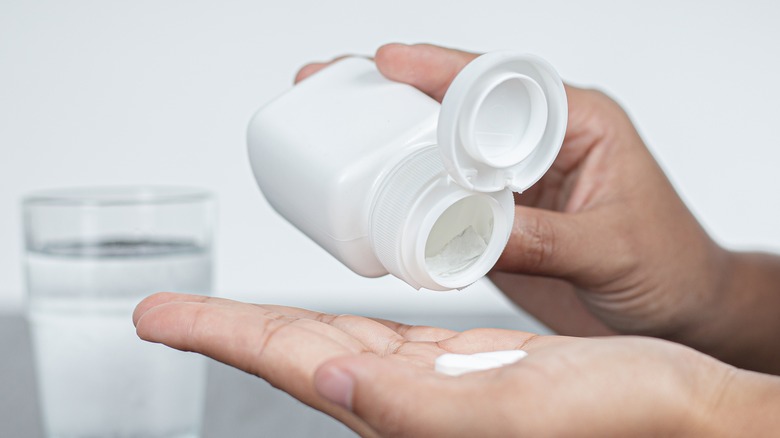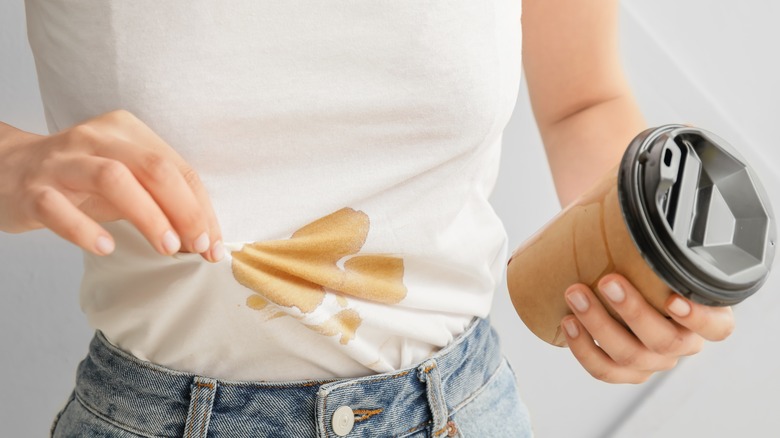Popular TikTok Laundry Hacks To Avoid At All Costs
We may receive a commission on purchases made from links.
Laundry. It feels like it never ends, so any helpful tips you can get are welcome — even if they're from TikTok. Unfortunately, not all advice is good advice. Some of the more popular laundry hacks on TikTok are quite bad for both your clothes and your washing machine, and there are some you should avoid at all costs. These range from seemingly helpful hacks like making your own laundry detergent to the completely illogical but now popular practice of mixing together multiple laundry detergents to try and make them last longer.
In this article, we'll share the laundry hacks, explain the theories behind them, and let you know why they're a bad idea. We'll also share hacks that do work so that you know what to do instead to keep your clothes, washer, and dryer all safe and happy. We want you to get your laundry done as quickly and effectively as possible without ruining your clothes or doing something that necessitates an expensive appliance repair. There are things everyone gets wrong when doing laundry, and we're here to help you avoid those mistakes.
Laundry stripping
Viewed over 182 million times, #laundrystripping has taken TikTok by storm. This hack involves soaking soiled items in hot water, Borax, washing soda, and laundry detergent using a large tub or your bathtub. The items are allowed to soak for five or six hours and then washed as normal. The theory is that stripping will deep clean the fabrics and remove dirt and oils that machine washing misses along with any buildup of laundry detergent.
Unfortunately, Borax creates alkaline water that can weaken fibers, as can hot water. Together, hot water and alkaline conditions can also strip dyes from fabrics, fading them and perhaps doing so unevenly. As a general rule, it's best not to strip most of your laundry as it can wear clothes out prematurely. If you feel like you need to strip your laundry, you're probably washing it incorrectly and may be using too much laundry detergent.
That being said, laundry stripping does work if you have a particularly soiled item. It's a process best saved for heavy items like towels and sheets that can withstand hot water. And it need not be as complicated or as lengthy as TikTok makes it. You can easily and effectively strip laundry in your washing machine with a water conditioner and some laundry detergent. You don't need to use your bathtub or take six hours to complete the process. In short, laundry stripping is something that you should do rarely and selectively, if at all.
Making your own detergent
Crafting your own laundry detergent sounds like a great idea. Countless recipes abound on TikTok and other online sources, so it's easy to find detergent formulas and inspiration. You can save money and use natural ingredients that don't contain chemicals. It sounds perfect.
But in this case, chemicals aren't necessarily bad. Commercial laundry detergents are specially formulated to deal with hard water and invisible dirt and stains that can attract and hold unpleasant odors. Modern laundry detergents also contain chemicals that prevent the dirt in the wash water from re-depositing onto your clothes. Homemade detergent just isn't going to get your clothes as clean. It's also important to know that some chemicals are dangerous when combined and, in the event of an unfortunate accident, homemade detergents aren't labeled with the ingredients and other information a poison control center may want to know.
If you want to save money, skip the homemade detergent. Instead, try washing your clothes in cool or cold water. Laundry detergents are now able to wash clothes effectively in cooler water temperatures. Wool dryer balls can eliminate the need for dryer sheets and drying your clothes on the line when the weather is nice will save on running the dryer. You can also switch to powdered detergent since it lasts longer than liquid.
Using dish soap
Many TikTokers are extolling the virtues of adding some dish soap to a rag or towel and then tossing it in with your wash. This seems like a great idea in a pinch if you're out of laundry detergent. And the videos posted on TikTok show crisp, superwhite sheets and towels. After all, dish soap removes grease and tough dirt, so it's perfect for the laundry, right?
Actually, no. Dish soap can cause problems with your washing machine, which is designed to use specific detergents. It creates too many suds that can get into the mechanical and electrical components of your washing machine and strain expensive parts like the pump motor. Too many suds can also cause an overflow and make a mess in your laundry room. Dish soap probably won't rinse out of your clothes completely, either, which means dirt is staying in your clothes too.
You can use dish soap to spot treat grease stains on clothes if you have an accident with cooking oil or car grease, but it's not intended as a replacement for laundry detergent. There are, however, several things you can substitute for laundry detergent in a pinch.
Subbing fabric softener for dryer sheets
On TikTok, it's all the rage to soak a rag or sponge in fabric softener and use it in the dryer instead of dryer sheets. This one is all about saving money, allowing you to buy just fabric softener instead of fabric softener and dryer sheets.
There are a few problems with this one. The first is that the two products don't do exactly the same thing, Both add a pleasant smell to the laundry and can soften clothes. But fabric softener prevents stretching and stops fuzzballs from forming on clothes. Dryer sheets reduce static. The two are made very differently as well. Liquid softeners are made from oil while dryer sheets contain a coating of something called stearic acid. The key takeaway here is that fabric softener is made with oils that don't get evenly distributed in the dryer, and they can leave oily spots on your clothes if used in it.
If you want to reduce static without dryer sheets but still enjoy a fresh scent, use fabric softener in the washing machine as intended and then utilize the cool-down setting on your dryer. This will save you money on dryer sheets without potentially staining your clothes. The bottom line on this hack is this: You wouldn't put a dryer sheet in the washer, so why would you put fabric softener in the dryer? If you're still not convinced dryer sheets are worth the money, check out all the ways you can use them outside the laundry room.
Adding vinegar to every load
As is often the case with urban legends and popular misadvice, this TikTok hack does have some basis in truth, but is ultimately misguided. The hack claims adding vinegar to every wash load will remove bacteria — and therefore smells — from clothes. Vinegar has antibacterial properties, so adding it to your wash is supposed to make it cleaner. A very similar hack advises adding a bit of lemon juice to the wash to add a fresh scent.
Vinegar does have some antibacterial properties, but what is sold in the grocery store is too diluted to offer much (if any) benefit. You would have to add five cups of vinegar to each load to get any significant antibacterial benefits. Vinegar and lemon juice are both acidic, as well, which means they can damage the rubber hoses and seals in your washing machine.
You likely already have other common household products that will help your laundry game, anyway — from mouthwash to milk, there are plenty of tips and tricks that will be more impactful. And if it's a fresh scent you're after, try these laundry hacks that will leave your clothes smelling fresh as a daisy.
Mixing laundry detergents together
This one is popular on TikTok, despite making very little sense. It claims that if you buy several boxes of different brands of powdered laundry detergent and mix them together in a large bin, you will have enough detergent to last for more than a year. In some cases, the videos claim the detergent will last for several years.
For one, this hack is illogical: It uses laundry detergent to make, um ... laundry detergent? Five boxes of laundry detergent, for example, will last you however long it normally does, whether you buy it all at once or throughout the year. You could also end up using some of the products in the mix beyond their expiration dates, especially if you add more detergent to your concoction when you start to run low. And unless you have a firm understanding of how all of the ingredients in the different detergents work, you could end up mixing together chemicals that cancel one another out or make each other less effective.
Using foil balls in the dryer
This hack claims that adding about three aluminum foil balls to your dryer will reduce static, thus eliminating the need for dryer sheets and saving you money. Aluminum is notoriously bad at conducting heat and won't catch fire at temperatures below 1,220 degrees Fahrenheit. Your dryer only reaches temperatures of about 135 degrees, so using it is perfectly safe. The foil is also rumored to dissipate static.
When tested by reviewers and laundry experts, aluminum foil balls did work better than using nothing at all to reduce static, but they were nowhere near as effective as dryer sheets. Foil balls can also snag your clothes with sharp edges and leave metal marks inside your dryer and on your clothes.
If banishing dryer sheets from your life is really important to you, take your laundry out of the dryer before it's completely dry and finish drying it on a line or rack to reduce static. You can also get some wool dryer balls. They're quieter than foil, reusable, and they reduce both static cling and drying times.There are lots of better ways to get rid of static cling in your laundry.
Dropping an aspirin in the wash
Although it may currently be making the rounds on TikTok, this is actually a very old trick that predates the social media platform. The theory goes that dissolving an aspirin in the washing machine leads to brighter whites and better stain removal. Aspirin contains acetylsalicylic acid which is the ingredient that supposedly makes this hack work.
The aspirin hack is technically true, but it requires a prohibitively expensive amount of aspirin to get results. Further complicating the issue is the fact that aspirin doesn't dissolve well in the lower water temperatures most modern washing machines use. This can lead to clogged pipes and filters. This hack may have worked better years ago when people washed their clothes in big pots of boiling water. Nowadays it's best to stick to taking aspirin for headaches and leave it out of your washing machine, where it could create an expensive repair bill.
Adding coffee and tea to the laundry
Another classic remedy, this hack involves adding a bit of coffee or tea to dark loads of laundry. This works as a sort of homemade dye, preventing dark colors from fading after multiple washes. The dark pigments in coffee and tea are known for their ability to leave behind dark stains on everything from light clothing to white tablecloths and even your teeth, so this hack seems logical enough.
This trick can work. Unfortunately, the pigments in coffee and tea can stain your washing machine, and the staining is really difficult to remove. And if the coffee or tea residue doesn't rinse completely out of your washer, it might be leaving behind food residue that can lead to mold growth in your washing machine. There is also no guarantee that this trick will dye your clothes evenly so they could look patchy, which is just as bad as faded.

